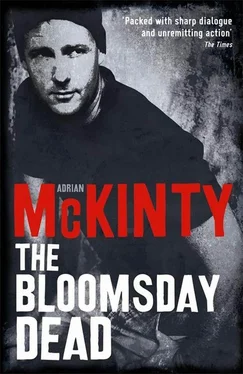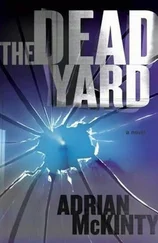Adrian McKinty - The Bloomsday Dead
Здесь есть возможность читать онлайн «Adrian McKinty - The Bloomsday Dead» весь текст электронной книги совершенно бесплатно (целиком полную версию без сокращений). В некоторых случаях можно слушать аудио, скачать через торрент в формате fb2 и присутствует краткое содержание. Жанр: Триллер, на английском языке. Описание произведения, (предисловие) а так же отзывы посетителей доступны на портале библиотеки ЛибКат.
- Название:The Bloomsday Dead
- Автор:
- Жанр:
- Год:неизвестен
- ISBN:нет данных
- Рейтинг книги:3 / 5. Голосов: 1
-
Избранное:Добавить в избранное
- Отзывы:
-
Ваша оценка:
- 60
- 1
- 2
- 3
- 4
- 5
The Bloomsday Dead: краткое содержание, описание и аннотация
Предлагаем к чтению аннотацию, описание, краткое содержание или предисловие (зависит от того, что написал сам автор книги «The Bloomsday Dead»). Если вы не нашли необходимую информацию о книге — напишите в комментариях, мы постараемся отыскать её.
The Bloomsday Dead — читать онлайн бесплатно полную книгу (весь текст) целиком
Ниже представлен текст книги, разбитый по страницам. Система сохранения места последней прочитанной страницы, позволяет с удобством читать онлайн бесплатно книгу «The Bloomsday Dead», без необходимости каждый раз заново искать на чём Вы остановились. Поставьте закладку, и сможете в любой момент перейти на страницу, на которой закончили чтение.
Интервал:
Закладка:
I was about to give the bastard a piece of my mind but then stopped, unclenched my fists, and found a place of inner tranquility.
“Ok, mate, I’ll get the bloody euros,” I said through the window and smiled reassuringly at him. He didn’t smile back. He seemed nervous. He wiped tiny beads of sweat off his forehead. Interesting, but I didn’t have the time to probe the inner psychology of a cabbie, I was freezing out here. I sprinted back to the overhang outside the terminal. I asked a pair of cops where I could change money.
“Inside couple of bureaus de change, Eire Bank’s got a better rate than National,” one said.
“And a prettier girl,” his partner added.
I found the two bureaus de change and headed for the National Bank. Old habit: whatever a peeler says, play safe and do the opposite.
I gave the girl three thousand dollars. She gave me back two thousand four hundred and ninety euros.
“Happy Bloomsday,” she said.
“Thanks, happy Bloom to you, too, love.”
I walked back out to the taxis. The driver was on his cell phone. He hung up hurriedly when he saw me, gave me a big fake smile.
“Ok, mate, where to? Connolly?” the driver asked.
“I haven’t been here in a while, is it Connolly Station where you get the trains to Belfast?”
“It is too now, and is that where you want to go?”
“No, I was just asking that to make small talk. Come on, let’s get out of here,” I said, once again betraying my irritation.
“Connolly Station it is,” the driver said, and I knew he was going to take the most expensive route that he bloody could.
Streets.
Trees.
Cars.
Dublin is a city I don’t know well. Drop me a few blocks from O’Connell Street and I’m banjaxed. I can get you to Trinity and St. Pat’s and a brothel opposite the Four Courts but that’s about it. It’s not my town at all. When I lived in Belfast I’d be down about twice a year for a rugby match. Don’t think I’ve ever stayed overnight. Lot of beggars about back then, now it’s yuppies with cell phones and PDAs.
Dubliners have changed quite a bit. Nowadays they’re increasingly like Londoners. Cosmopolitan, busy, cheeky. They think just because they know where to get a decent pint of Guinness or a half-decent cup of coffee that this gives them the right to put on airs. I suppose they’re arrogant because they live in a nice town. Good new statues, new architecture, and a really lovely Georgian zone near Trinity. Belfast, by contrast, is a bloody disaster area. The old ugliness from before the war, the 1970s bomb-damage ugliness, the 1990s rebuilding ugliness. Belfast never makes Lonely Planet’s list of most beautiful cities. Still, salt of the earth. Scotchy used to say, “Scratch a Dubliner and underneath you’ll find a snob; scratch a man from Belfast and he’ll punch you in the face for taking liberties.”
Anyway, I don’t know Dublin, so it wasn’t until I saw that the cabbie was driving over a Liffey River bridge that I began to get suspicious.
Dublin Airport is in the north of the city.
Connolly Station, as far as I remembered, is also in the north of the city. Certainly north of the Liffey. Driving from the airport to Connolly should not for any reason involve crossing the river.
I reexamined the driver. Scars on his hands. Big guy, bruiser, you would have thought. Slow, but you wouldn’t want to mess with him. Knock your block off, he would.
No, I didn’t like him at all.
And now that I checked out the cab, I began to notice a few odd things as well.
There was no meter, but that wasn’t so unusual, a lot of minicabs in Dublin didn’t have meters, same with gypsy cabs in New York. But there was no glass partition between the driver and me. No credit card machine, no identity card hanging from his mirror, and he had no sticker allowing him into airport parking.
In fact, there was nothing in the cab that looked like a cab at all.
A wee moment of interior monologue: Michael, don’t be so paranoid. He’s just a working stiff. He’s not out to get you. The whole world doesn’t revolve around you and your fucking problems. You know what the word solipsism means? Well, look it up in the dictionary, you eejit.
Aye, but then again who exactly had the driver been on the phone with that he was so fucking anxious to hang up on when I came back? And further on that point, why send me away in the first place unless it was to make a call? Of course he could take dollars. Everybody took dollars, especially when it was off the books.
I tried to peer through the window to figure out where we were. The last of the night had been more or less banished but it was hard to see now through the morning mist. Vague buildings went past, but there were no landmarks, not that I could have recognized the landmarks anyway. Maybe St. Patrick’s Cathedral and Trinity College, but anything else would have left me none the wiser.
“Do you have a cigarette?” I asked the driver, for something to say.
“I do not. I have given up. Since my birthday. Over a month now.”
“Good for you, it’s a filthy habit,” I agreed.
“Aye, well, for me the encouragement was the pubs, you know,” the driver said.
“What?”
“The pubs, you know, the ban,” he said.
“They banned smoking in Irish pubs? Hadn’t heard.”
“Every pub in the south. No smoking anywhere; I was opposed, but it’s a good thing, I see that now, helped me quit. Social thing, out with your mates. I notice the difference when I go up to Belfast, Jesus, the smoke would knock you out.”
“You go up to Belfast often?” I asked in a completely neutral voice.
“Aye, now and again. Business, you know?”
“What sort of business, what’s your line?”
“Oh, nothing you would be interested in. The taxi business, that’s it. Stuff to do with that. You know how it is.”
I did not know how it was. The taxi business, in Belfast? The more he talked the more I didn’t like this little scenario.
“Are we near the station?” I asked.
“Not too far now, I’ll have you there for the first Enterprise train. Think that goes off at six o’clock. You’ll have time to get your breakfast and get a paper and a seat. You should reserve your seat, though, it’s very popular. Faster, too, just a couple of hours and you’ll be in Central Station in Belfast. It’s great. Really quick now that the Provos have stopped bombing the line,” the driver said rapidly.
“What’s your name if you don’t mind me asking?” I said.
“Padraig Lugh. But it’s funny, you know, nobody ever calls me Paddy or Pad or anything like that, everybody always calls me Padraig.”
“Do you want them to call you Paddy?”
“No, I do not. I like Padraig.”
“How do you spell that last name?” I asked, wondering if it was fake.
“L-u-g-h. He’s the old Irish sun god, you know.”
“I know,” I said.
“And what’s your name?” he asked.
“Name’s Michael,” I said slowly, not liking his curiosity.
“Pleased to meet you, Michael,” Padraig said and put his hand behind his head for me to shake.
I shook it. It was cold, clammy, trembling.
Jesus, was Padraig a player? It couldn’t be coincidence if he was. Maybe they were waiting for me. Maybe the customs guy had tipped them off and told his mates that he would hold me just long enough for them to get there. Maybe Paddy had been on the phone to them. Sent me back in to get euros just to confirm my ID.
Or maybe he was just an ordinary driver with a touch of palsy, taking me on the magical mystery tour to bump up his fare.
I let go of his hand.
“It’s nice to meet you, too, Padraig. Listen, I was wondering, I couldn’t help noticing that we’d crossed over the Liffey.”
Читать дальшеИнтервал:
Закладка:
Похожие книги на «The Bloomsday Dead»
Представляем Вашему вниманию похожие книги на «The Bloomsday Dead» списком для выбора. Мы отобрали схожую по названию и смыслу литературу в надежде предоставить читателям больше вариантов отыскать новые, интересные, ещё непрочитанные произведения.
Обсуждение, отзывы о книге «The Bloomsday Dead» и просто собственные мнения читателей. Оставьте ваши комментарии, напишите, что Вы думаете о произведении, его смысле или главных героях. Укажите что конкретно понравилось, а что нет, и почему Вы так считаете.










